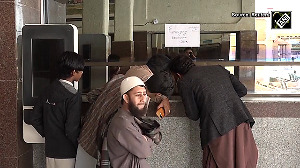Reserve Bank of India Deputy Governor Yaga Venugopal Reddy stepped out of the Reserve Bank of India on July 31 last year to join the International Monetary Fund as its executive director.
A year later he is set to come back to Mint Street with a bigger responsibility as governor.
Few bureaucrats have played a role in economic policy making in India. Fewer of them have made original contributions.
And only a handful have changed the course of economic policy and steered it in a new direction. Reddy did all three.
He did it when it mattered the most -- in the 1990s when the country was in the throes of balance of payment crisis and liberalisation was launched.
If you ask him what his most difficult moment at RBI was, he wouldn't reply. But ask him what his most important moment at the central bank. His prompt reply will be the 1997 Goa speech.
"This was the first time the central bank talked the market. The RBI wanted to convey a message and see how the market reacted," he had said last year while leaving office.
In his famous Goa speech on the dilemmas of exchange rate management delivered on August 15 1997, he had said: "As per the real effective exchange rate, it would certainly appear that the rupee is overvalued, irrespective of the base chosen. The overvaluation has got exacerbated with the sharp appreciation of the dollar against other major currencies such as the DM and the Yen."
"In the context of large capital flows (inflows as well as outflows) within a short period, it may not be possible to prevent movements in the exchange rate away from the fundamentals."
"Hence, the management of rate fluctuations becomes passive, that is, one of preventing undue appreciation in the context of large inflows and providing supply of dollars in the market to prevent sharp depreciation. But, the correction, if any, has to be gradual and not sudden."
He also said: "The recent experience of the emerging economies shows that, any currency could come under speculative attack if its exchange rate is out of alignment with fundamentals for a prolonged period of time."
Following this, the rupee tumbled and the markets behaved exactly the way the central bank wanted it to.
Reddy was instrumental in starting the process of reform in the debt markets. His single biggest contribution to India's monetary system is the conceptualisation and introduction of the liquidity adjustment facility.
With this system in place, the overnight money has emerged as a pure inter-bank market and the defunct repo became a potent and powerful lever of liquidity control and a guiding factor for short-term interest rates.
He also set up the Regulation Review Authority which streamlined all the arcane procedures and made regulation more meaningful and less cumbersome.
As a central banker, he was wary of political uncertainties as they influence the market. "Whenever there is political uncertainty, we are on our toes. And this has happened so many times during my time here," he had said.
The three things the central bank is most careful about, according to him, are the conditions of the market, the contagion and the interests of depositors.
As the joint secretary, economic affairs, in the finance ministry he was in charge of the transition of the exchange rate system from a fixed rate regime to the current convertible regime.
He can legitimately claim authorship of two intermediate regimes - first the Exim Scrips and then the Liberalised Exchange Rate Management System.
LERMS is a kind of dual exchange rate system which was announced in Manmohan Singh's second budget. It was later replaced by a single, floating exchange rate.
A 1964 batch Indian Administrative Service officer, he was transferred eight times in his first four years.
He spent the bulk of his time drawing up plans for the finance and planning departments in his state, Andhra Pradesh.
He spent six years at the Centre, over a period of time. He is one of the rare persons in the financial world who can combine academic rigour with bureaucratic activism.
On August 5 last year he left for Washington to become executive director at the IMF.
"Philosophically, I am against any debt. Borrowing from the IMF, or for that matter anybody, is bad," Reddy had said at that time.
He is coming back to India in another August. The times have changed and India, once a debtor to IMF, now has become a creditor!






 © 2025
© 2025